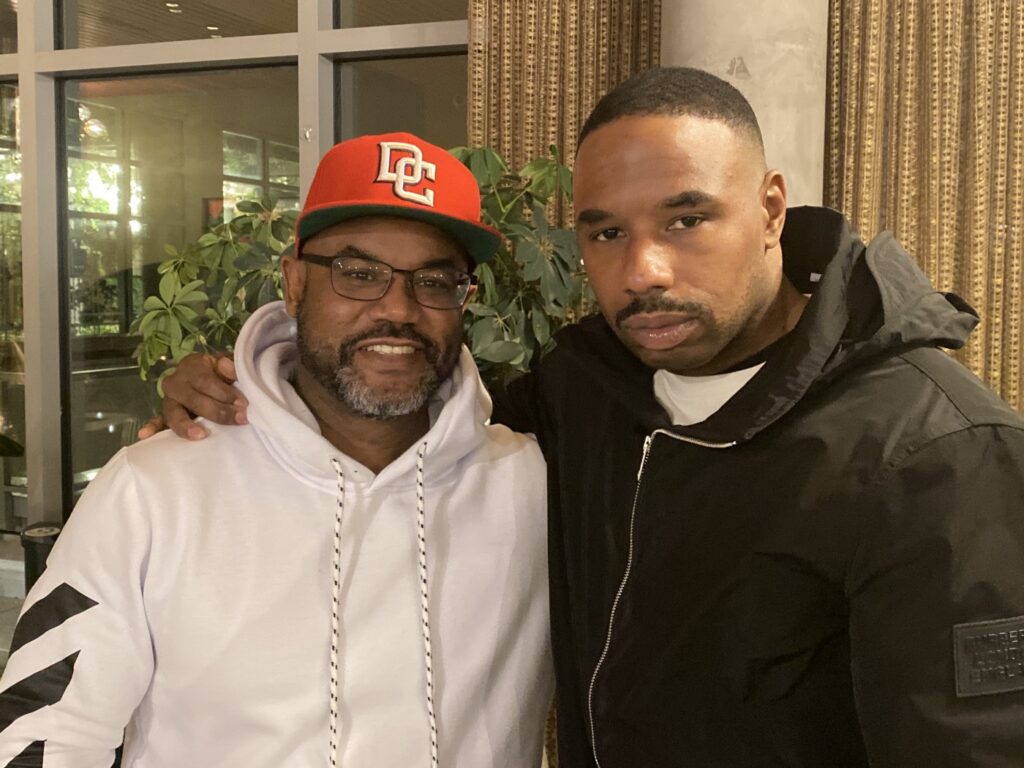The Maya Angelou Academy in Washington DC
By: Julie Johnson and Raymond Rodriguez
When you walk on the campus of the Maya Angelou Academy at New Beginnings, it doesn’t feel like a prison or juvenile detention center. There are no high barbed wire fences, no guards out front standing duty. The school, housing, and activity buildings are inviting with colorful walls (shown above) and a mural inspired by Maya Angelou (shown below), painted by one of the students. Classrooms have the day’s lesson written on the smart board and the walls are decorated with student work and inspiring quotes. There is an art and welding room, an indoor gym and basketball court, an outdoor track, and an auditorium for graduations and special ceremonies. But make no mistake, the students here are not free to leave. While they have friendly staff and rooms of their own, the approximately 40 youth, ranging from ages 12 to 19, are incarcerated and living in a maximum security facility.
Becoming
The Maya Angelou Academy at New Beginnings provides education for DC’s justice-involved youth. Located about 30 minutes outside of DC in Laurel, MD, New Beginnings is the site of the former juvenile detention center, Oak Hill, an unsafe and violent facility that brought harm to the young people in its care. James Carpenter, a resident of Oak Hill at age sixteen, noted, “It was a gladiator school.” The situation was so bad that a group of lawyers brought forth a lawsuit in 1986, known as Jerry M., protesting the inhumane treatment. The lawsuit led to Oak Hill and two similar facilities in DC being shut down. Independent oversight of DC juvenile facilities was mandated and would last for the next 35 years.
In 2006, Maya Angelou Public Charter School was invited to apply for the contract to operate the school at New Beginnings. At the time, Maya Angelou was a small school, just eight years old, created by David Domenici, a former lawyer, and James Forman, a former public defender. The school was known for providing a strong education with a high level of support to young people who were justice-impacted or who had not succeeded in traditional educational settings.
David became the principal of the Maya Angelou Academy at New Beginnings and set out to create the best school in any juvenile facility in the country. First, students would be referred to as “scholars” to highlight their potential and set high expectations for them to excel. They would receive a plan for education and graduation, along with ongoing wrap-around support from their advocate, counselor, and other school staff. Courses would be organized into short, engaging units. Scholars who were significantly behind in their studies would pursue the GED. There would be award ceremonies at the end of every unit to recognize scholars’ success and a high school graduation every year. Speakers would come into the school and share their stories. Business professionals would conduct mock interviews to help scholars prepare for future work. Scholars would begin to envision and achieve a different trajectory for themselves.
The school built strong relationships with the DC Department of Youth Rehabilitative Services (DYRS), who ran New Beginnings. School staff worked closely with the DYRS correctional officers and staff to ensure that learning was prioritized and that scholars were treated like students first. Joint planning and collaborative efforts focused on rehabilitation and restorative justice.
Impacting
Today, the Maya Angelou Academy at New Beginnings is a model for quality education in secure settings. People come from all over the nation and world to visit the school and learn about this approach.
Part of what makes the Maya Angelou Academy so unique is the people who lead, teach, and work there. They seek to enact Dr. Angelou’s words, “my mission in life is not merely to survive…but to thrive.” They give scholars the tools needed to pursue a different path and make choices to invest in a life that is personally fulfilling and meaningful. As one staff member, Tinnell Slade, notes, “my aim is to provide the youth with an understanding that their situations don’t define what they will and can be in life. I teach them to never give up on their strengths and to know their strengths can carry them further in life.”
Leadership has changed. David Domenici is no longer the principal. He went on to create BreakFree Education, which works to radically improve education in juvenile and criminal justice systems, using practices largely based on the Maya Angelou Academy model. James Forman, co-founder of Maya Angelou Schools, is now a professor at Yale Law School and a Pulitzer prize winning author of Locking Up Our Own: Crime and Punishment in Black America.
Over the past fifteen years, Maya Angelou Academy at New Beginnings has touched the lives of close to 800 scholars, educating them for the term of their sentences, which can range from several months to years. The majority of scholars achieve significant academic gains before being released. Nearly 100 scholars who stayed at the Academy through the end of high school graduated.
Upon release, a Maya staff advocate remains connected with scholars for three months. The Maya advocate facilitates a smooth transition for the scholar to their new school, visits them weekly, and serves as a resource to their family. “Supporting the scholars after departure is very important to me because the community is where they experience the least support and where they face most of their challenges” shares Khafayat Shonekan, one of Maya’s advocates.
These efforts have long lasting impacts. Scholars from the Academy have returned to the community to do well in school, get jobs, and give back to the community. Some go on to college. Some still struggle and may return to the Academy, where they receive additional support and ongoing education.
All of this stands in sharp contrast to other juvenile prisons and detention centers around the country, which are more likely to look and feel like a prison and where education is not prioritized. “This is what every school in a juvenile facility across the country should look like, notes David Domenici, “but sadly, it’s the exception, not the norm.”
Expanding
In October 2021, in response to an emergency request, Maya Angelou Schools established two new Maya Academies in DC’s secure settings, one at the DC Jail and one at the Youth Services Center, which is DC’s pretrial juvenile detention center. Dr. Clarisse Mendoza, CEO of Maya Angelou Schools and the See Forever Foundation, states, “we heard the concerns of lawyers, advocates and others related to the education services being provided at the two sites. We are committed to doing all that we can to support the city’s goal of providing quality education and other services while these young adults are serving their time at these facilities.”
These developments hold the potential for Maya Angelou Schools to have a greater impact on transforming the lives of DC’s justice-impacted youth. The work is still in-process with much more yet to do. But one thing is certain — every young person that interacts with the Maya Angelou Academy has the chance to see themselves and their potential in a new light.
As one current scholar notes, “The Academy has taught me patience and accountability. It makes me appreciate school more. I am receiving good grades and being recognized for my achievements through awards. That makes me better as a person. It makes me want to go to school in the community once I am released because I finally understand the purpose of education. The Academy recognizes my flaws while helping rehabilitate them and they also recognize areas of growth. They don’t view me for the mistakes I made.”
Julie Johnson is a long-standing board member and former board chair of Maya Angelou Schools. Raymond Rodriguez is a Community Placement Specialist at the Maya Angelou Academy-Youth Services Center. He formerly served as an Academic Support Specialist at Maya Angelou Academy at New Beginnings.



